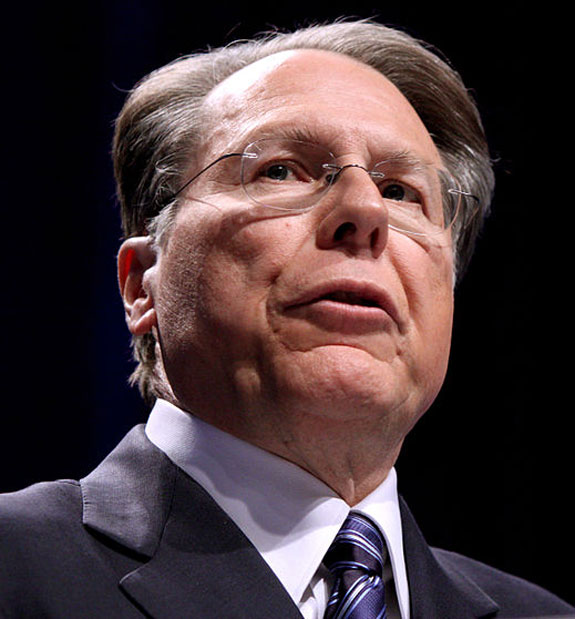
After Stand Your Ground passed in Florida, NRA executive vice president Wayne LaPierre said the pro-gun organization would use the victory to promote the law nationwide. (Photo by Gage Skidmore.)
By Howard Goodman
Florida Center for Investigative Reporting
It’s no coincidence that after Florida passed its Stand Your Ground law in 2005, many other states followed suit.
The law — which greatly expanded the right to use deadly force — had been vigorously pushed by the National Rifle Association before being passed overwhelming by a deferential legislature and signed by then-Gov. Jeb Bush, who called it a “commonsense” approach to making the citizenry safer.
It has not exactly worked out that way.
George Zimmerman, who shot and killed the unarmed black teenager Trayvon Martin on February 26, has not been arrested or charged — sparking a national outrage — largely because Sanford police believed his claim of self-defense. Under the Stand Your Ground doctrine, a shooter is justified in firing if he “reasonably believes” his life is in danger. The law scrapped the time-honored legal duty to retreat in public places.
As soon as the bill was signed into law in Florida, the NRA’s executive vice president, Wayne LaPierre, said the pro-gun organization would use the victory to promote the law everywhere.
Within weeks, a proposed statute with almost the exact wording of the Florida law was adopted by the American Legislative Exchange Council (ALEC). That’s a conservative organization that pushes for laws favorable to its patrons, mainly scores of U.S. corporations. One of those backers is the NRA.
ALEC’s method is to hand cookie-cutter “model” bills to sympathetic state lawmakers — mostly conservative Republicans — who then sponsor them in their statehouses. They’ve been very effective. According to Mother Jones magazine, 23 states have followed Florida’s lead in passing these laws.
The NRA has long been a high-caliber force in Florida’s legislature. Between 2003 and 2010, the gun lobby gave $2.7 million to state lawmakers, according to the National Institute on Money in State Politics. They contributed the legal limit, $500, to Jeb Bush’s 2002 gubernatorial re-election campaign, an additional $60,000 to the state’s majority Republican Party — though none to Democrats.
In the vote for bill, all 22 legislators who received NRA money said “yea,” writes Think Progress. But so did many others. The bill was passed by the House, 94-20. It swept the Senate, 39-0. When Bush signed it, the NRA’s longtime Tallahassee lobbyist, Marion Hammer, was at his side.
The NRA is still pushing the law. On March 1, just a few days after Martin was killed, the NRA in a blog post urged Minnesota’s Democratic governor, Mark Dayton, to sign a bill similar to Florida’s law. Dayton vetoed the bill. In his veto letter, he cited objections from law-enforcement agencies: “They believe it will increase the dangers to them in the performance of their duties.”
The NRA is also busily lobbying for measures in Iowa and Alaska.
Bush has been silent on Trayvon Martin’s killing and the eruption of outrage and protest that have followed. But when he signed the bill, he said that when people faced life-threatening situations, “to have to retreat and put yourself in a very precarious position defies commonsense.”
But John F. Timoney, who was then Miami’s police chief, immediately called the bill unnecessary and dangerous. As reporter Abby Goodnough wrote in the New York Times:
Chief Timoney, who has successfully pushed his police officers to use less deadly force, said many people, including children, could become innocent victims. The bill could make gun owners, including drivers with road rage or drunken sports fans who get into fights leaving ball games, assume they have “total immunity,” he said.
“Whether it’s trick-or-treaters or kids playing in the yard of someone who doesn’t want them there or some drunk guy stumbling into the wrong house,” Chief Timoney said, “you’re encouraging people to possibly use deadly physical force where it shouldn’t be used.”
The chief had it right.
